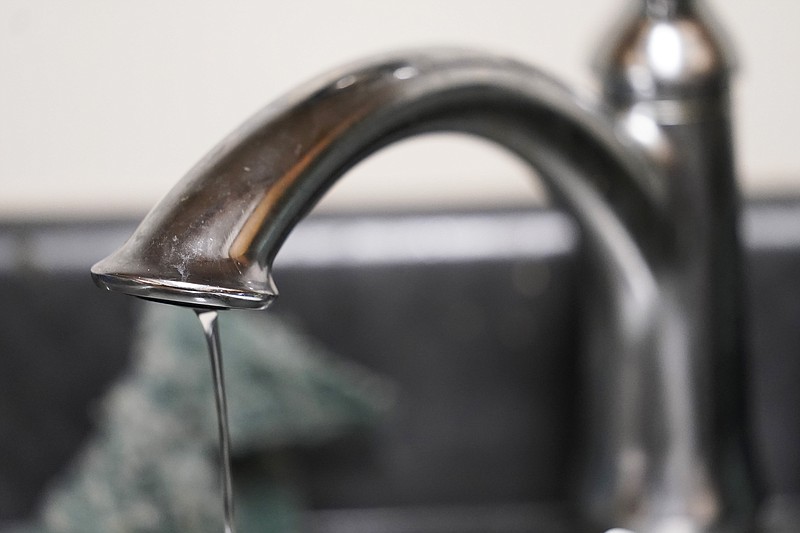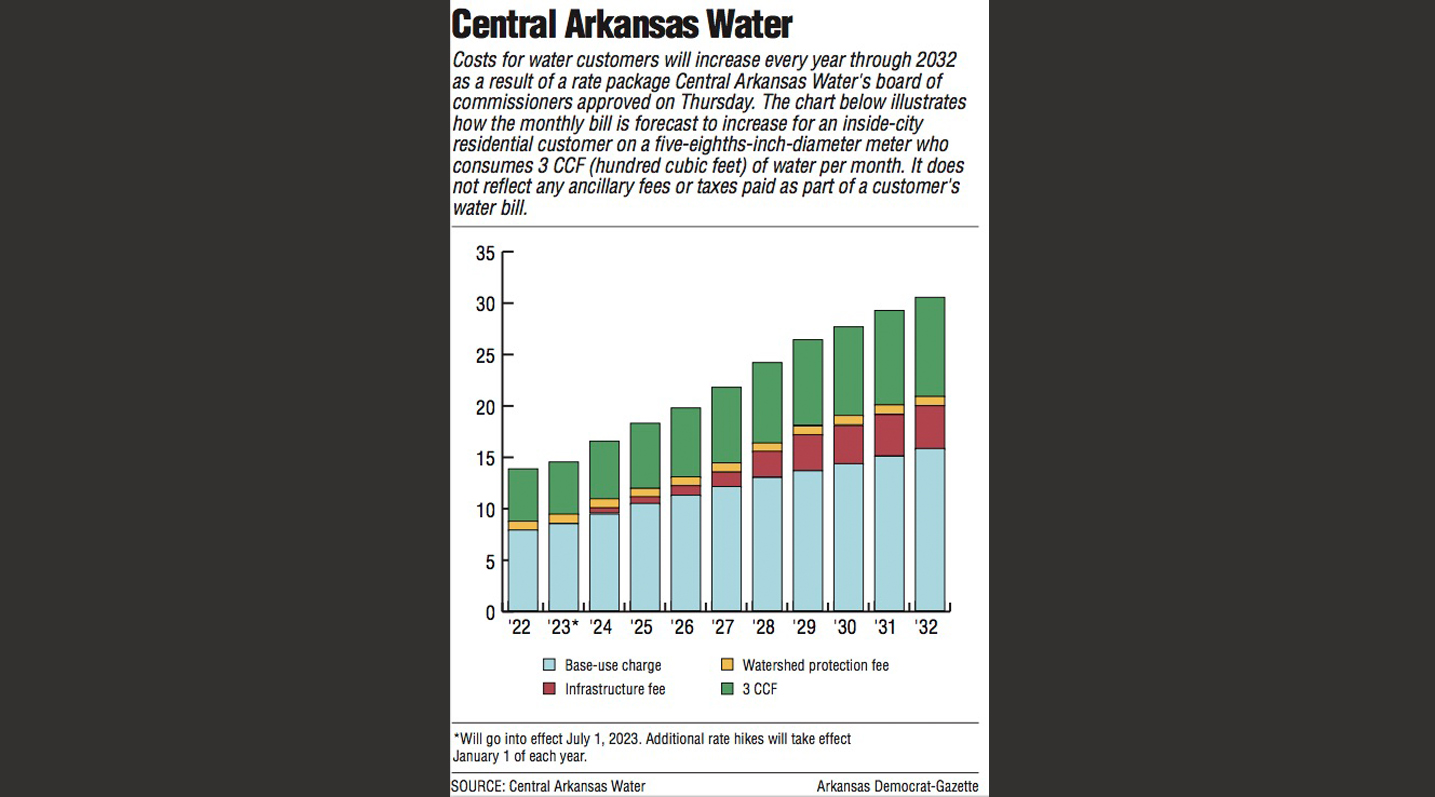Central Arkansas Water's board of commissioners at a meeting Thursday approved a 10-year schedule of rate increases meant to boost revenue that will impose higher prices on water customers every year through 2032.
The rate resolution was approved in a unanimous voice vote of the seven-member board.
After adopting the resolution, board members approved two of three proposed amendments written to give Central Arkansas Water flexibility on certain elements of the rate package. Tad Bohannon, the utility's chief executive officer, brought forward the amendments for the board's consideration.
The two amendments that were adopted give the utility the authority to reduce, defer or cancel rate increases and to create a rate tier below Tier 1 -- the lowest billing tier tied to the volume of water a customer consumes per month.
The third proposed amendment, which would allow the utility to adopt an "incentive commercial rate" tied to economic development projects, was tabled until the next board meeting.
The first set of higher rates will take effect July 1. Another set of rate increases will take effect Jan. 1, 2024, then Jan. 1 of every subsequent year.
Working with the consulting firm Raftelis, Central Arkansas Water officials arrived at the 10-year rate schedule late last year.
They believe $685 million in needed capital improvements as well as the costs associated with increasing and retaining the utility's workforce will require revenue to double over the next decade.
Nevertheless, utility officials have predicted that Central Arkansas Water's rates will remain affordable compared with other water providers even after the full slate of increases goes into effect.
A vote on the rate package was originally scheduled for December and delayed until this month. Officials attributed the delay to an error that had been identified in the rate model.
Central Arkansas Water's board is made up of representatives from its two constituent cities -- four from Little Rock and three from North Little Rock.
The rate package approved Thursday encompasses a series of changes to the utility's billing framework, including a move to a three-tier system of volumetric charges from the current two-tier system.
A typical household on a five-eighths-inch-diameter meter that consumes water at a rate of 3 CCF (hundred cubic feet) per month is expected to experience an increase to its monthly bill from $15.80 in 2022 to $32.51 by 2032, according to a recent Central Arkansas Water rate forecast.
One CCF equals 748 gallons.
As they do today, customers outside the cities of Little Rock and North Little Rock will continue to pay higher prices for water compared with inside-city customers under the rate package approved Thursday.
The monthly base charge for inside-city residential and commercial customers on a five-eighths-inch-diameter meter will increase from its current rate of $7.85 to $8.46 starting July 1. Subsequent year-over-year increases will bring the same rate to $15.78 by 2032.
The volume-based rates paid by customers also will get progressively higher over the same period.
Additionally, in order to fund renovations to the Jack H. Wilson Water Treatment Plant, improvements to the essential source-water reservoir of Lake Maumelle and construction of a water pipeline 60 inches in diameter, the utility will levy an infrastructure fee on customers starting in 2024.
During the first year, the fee will be 50 cents per month for customers on a five-eighths-inch-diameter meter and gradually increase to reach $4.25 by 2032, according to the rate schedule. However, utility officials believe the fee may need to be adjusted based on the actual costs of the three aforementioned projects.
The infrastructure fee is intended to roll off once debt associated with the projects is retired.
Before the vote on Thursday, Little Rock City Director Virgil Miller Jr., who represents Ward 1, during the public comment period told water commissioners of some concerns about the inclusiveness of the process by which the utility undertook the rate proposal in light of a resolution before the city board.
Earlier this week, Miller was named the city board's liaison to Central Arkansas Water's board.
He noted that his ward is home to many low- and moderate-income people and he has been getting phone calls about the rate proposal. All the same, Miller said that everyone wants to have clean drinking water come out of their spigot and avoid a "nightmare" of the kind that happened in Jackson, Miss., or Memphis.
"I think you have a good case. It just needs to be shared," Miller told commissioners.
Miller read from a proposed resolution that is on the Little Rock city board's agenda for a meeting next week.
The resolution, sponsored by Ward 5 City Director Lance Hines, would direct Little Rock representatives on the utility's board to vote against rate increases pending a thorough discussion with the city councils on both sides of the Arkansas River.
The measure would also direct the city attorney to prepare changes to the interlocal agreement between Little Rock and North Little Rock to ensure that both municipalities are approached by the utility and able to jointly set parameters before a schedule of rate increases.
Both Little Rock and North Little Rock's city councils would have to vote against the rate resolution for the increases not to take effect now that the package has received the approval of Central Arkansas Water's board.
On Tuesday, Central Arkansas Water officials participated in a working session with members of the Little Rock city board. During the meeting, Bohannon and others explained the rationale behind the rate proposal.
At one point, asked by a city board member to confirm that Central Arkansas Water would not enact an additional rate increase over the next decade on top of the package under consideration, absent some catastrophe, Bohannon said, "Yes, sir."
Citing Miller's comments as well as the dialogue during the city board session, Central Arkansas Water Commissioner Jim McKenzie during the meeting Thursday proposed having the utility's CEO work with Little Rock and North Little Rock's city councils to develop a written protocol for how to involve the two cities with regard to rate discussions.
McKenzie's motion was approved in a voice vote, with one no vote from Commissioner Anthony Kendall.
In an interview Thursday after the board's vote to adopt the rate resolution, Bohannon called the upcoming work on the Wilson treatment plant a "generational project."
The pipeline replacements funded by the rate package will create the most immediate difference for residential customers, Bohannon said.
When those galvanized pipes break, the result is people discover they have no water when they get home from the grocery store after work, he said.
"That's the one that they're gonna go, 'Oh, I see my dollars working,' 'cause they'll see the trucks out. They'll see the crews out," Bohannon said.
Nearly every water system failure that made the news elsewhere over the past two months was a result of leaky pipes that led to a loss of pressure in the system when a few more breaks occurred, Bohannon said.
He described infrastructure replacement as "what makes the system robust."

